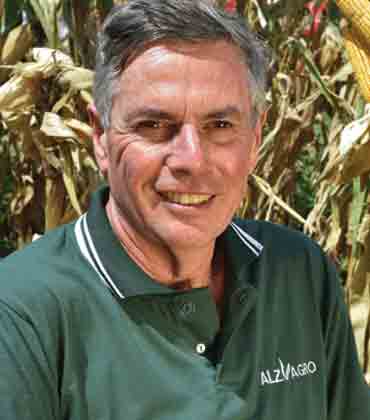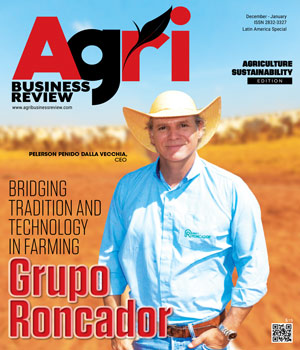The agriculture industry is at a pivotal juncture. In an age dominated by growing environmental awareness and the urgent need for sustainable practices, farmers and agribusinesses actively seek innovative solutions that enhance productivity while embracing eco-friendly principles. The circular economy is a dynamic approach that accentuates environmental protection while ensuring economic viability.
ALZ-Agro is a consortium of six companies with a shared commitment to advancing agricultural practices sustainably, and that has rapidly gained prominence in Argentina’s agricultural landscape. Rooted in the spirit of innovation, it excels in the process of developing business, products and solutions, establishing strategic alliances with leading companies in the agricultural and food sector.
The Beginnings of this Journey
In 2007, having led successful agricultural companies, the founding partners began their journey independently. Their first steps were a licensing agreement for corn hybrids to Dow Agrosciencies, now Corteva, and the development of an organic biostimulant obtained from the yeast manufacturing process. Then it was one of the first transformations of a byproduct into an input that improves the production process of crops such as soybeans, corn, wheat, among others.
That first approach to the concept of circular economy led them to the next step that was to enter the cattle feed business, based on byproducts of various industries, such as brewery, malt and yeasts. Each of these steps required not only leveraging these byproducts, but also developing practical solutions to streamline their use by farmers. In a few years, they became part of the daily diet of more than 250,000 cows.
“Not only do we develop valuable products for our clients, but we also provide solutions to other industries through the use of byproducts,” says Pérez.

With the Smartfoil biostimulant, ALZ-Agro achieved market leadership in the extensive crops segment. In addition to being organic, this product reduces a portion of nitrogen fertilization, thereby allowing a 30 percent reduction in the system's carbon footprint.
Another example of circular economy is the utilization of a waste product from a pharmaceutic industry to produce an adjuvant. When applied, it improves the quality of hard waters and achieves higher efficiency of applied phytosanitaries.
Revolutionizing Cattle Feeding
Nutriliq, a groundbreaking product developed by ALZ-Agro, demonstrates the company's commitment to environmental sustainability in the cattle farming sector. This is a liquid product that incorporates in its composition byproducts from other industries. This factor is innovative in the food system in Argentina. The cutting-edge formula of Nutriliq improves the digestibility of the fibers consumed by the animal, reduces gas emissions, and achieves greater efficiency in the livestock system. Addressing methane emissions at their source, ALZ-Agro offers a comprehensive solution for sustainable cattle farming.
An illustration of Nutriliq's effectiveness unfolded during a severe drought in Argentina over the past year. It significantly improved the quality of cattle feed when pastures turned into poor-quality hay and livestock were at risk. Farmers who adopted Nutriliq were able to save their cattle from harsh conditions.
New Developments
Today, ALZ-Agro is developing an innovative product: a sustainable protein that leverages the benefits of black soldier fly larvae fed with byproducts from the brewing industry, among other sources. This pioneering practice yields insect meal with an exceptional composition of amino acids, oil, and other products for animal feed.
“The protein we develop from byproducts and black soldier fly larvae is a continuous process that allows us to obtain products of the highest quality in less time, and with less use of space and water,” says Savage.
They also signed agreements with renewable energy production companies to convert their waste into organic fertilizers. Based on the circular economy concept, the development of new products with lower environmental impact allows them to project an even broader range of offerings in the coming years.
ALZ-Agro Ecosystem
Beyond its core focus on agriculture and cattle farming, ALZ-Agro's offerings encompass financial services and digital platforms. Its seed division supplies high-quality genetic materials to farmers, collaborating with nearly 300 dealers in Argentina.
ALZ-Agro's innovation extends to QIRA. It is a digital marketplace designed to streamline the supply processes for producers, in line with the new trends of consumers.
In addition to business, ALZ-Agro actively participates in corporate social responsibility initiatives, providing support to various organizations working with vulnerable sectors.
A Remarkable Journey Toward Global Sustainability
“The vision of ALZ-Agro is to be a sustainable and innovative agribusiness company with strategic alliances with its dealers and suppliers, and with international reach,” says Pérez.
Attributing its success to a dedicated team, ALZ-Agro has evolved from a four-person startup to over 120 professionals. The company is poised for international growth with projects such as insect-based proteins, organic fertilizers, and animal nutrition. It is already based in Uruguay and starts operations in Paraguay, Brazil and Peru. In the near future, it aims to expand to the United States and other countries.
Guided by visionary leaders, it is committed to a future where agriculture and cattle farming harmonize with the environment. As it adapts to global demands and challenges, ALZ-Agro remains a beacon of sustainable practices, setting the standard for a more environmentally conscious and economically viable agricultural future.
ALZ-Agro is a consortium of six companies with a shared commitment to advancing agricultural practices sustainably, and that has rapidly gained prominence in Argentina’s agricultural landscape. Rooted in the spirit of innovation, it excels in the process of developing business, products and solutions, establishing strategic alliances with leading companies in the agricultural and food sector.
The Beginnings of this Journey
In 2007, having led successful agricultural companies, the founding partners began their journey independently. Their first steps were a licensing agreement for corn hybrids to Dow Agrosciencies, now Corteva, and the development of an organic biostimulant obtained from the yeast manufacturing process. Then it was one of the first transformations of a byproduct into an input that improves the production process of crops such as soybeans, corn, wheat, among others.
The vision of ALZ-Agro is to be a sustainable, innovative agribusiness company with strategic alliances with its dealers and suppliers, and with international reach
“Not only do we develop valuable products for our clients, but we also provide solutions to other industries through the use of byproducts,” says Pérez.

With the Smartfoil biostimulant, ALZ-Agro achieved market leadership in the extensive crops segment. In addition to being organic, this product reduces a portion of nitrogen fertilization, thereby allowing a 30 percent reduction in the system's carbon footprint.
Another example of circular economy is the utilization of a waste product from a pharmaceutic industry to produce an adjuvant. When applied, it improves the quality of hard waters and achieves higher efficiency of applied phytosanitaries.
Revolutionizing Cattle Feeding
Nutriliq, a groundbreaking product developed by ALZ-Agro, demonstrates the company's commitment to environmental sustainability in the cattle farming sector. This is a liquid product that incorporates in its composition byproducts from other industries. This factor is innovative in the food system in Argentina. The cutting-edge formula of Nutriliq improves the digestibility of the fibers consumed by the animal, reduces gas emissions, and achieves greater efficiency in the livestock system. Addressing methane emissions at their source, ALZ-Agro offers a comprehensive solution for sustainable cattle farming.
-
Not only do we develop valuable products for our clients, but we also provide solutions to other industries through the use of byproducts
New Developments
Today, ALZ-Agro is developing an innovative product: a sustainable protein that leverages the benefits of black soldier fly larvae fed with byproducts from the brewing industry, among other sources. This pioneering practice yields insect meal with an exceptional composition of amino acids, oil, and other products for animal feed.
“The protein we develop from byproducts and black soldier fly larvae is a continuous process that allows us to obtain products of the highest quality in less time, and with less use of space and water,” says Savage.
They also signed agreements with renewable energy production companies to convert their waste into organic fertilizers. Based on the circular economy concept, the development of new products with lower environmental impact allows them to project an even broader range of offerings in the coming years.
ALZ-Agro Ecosystem
Beyond its core focus on agriculture and cattle farming, ALZ-Agro's offerings encompass financial services and digital platforms. Its seed division supplies high-quality genetic materials to farmers, collaborating with nearly 300 dealers in Argentina.
ALZ-Agro's innovation extends to QIRA. It is a digital marketplace designed to streamline the supply processes for producers, in line with the new trends of consumers.
In addition to business, ALZ-Agro actively participates in corporate social responsibility initiatives, providing support to various organizations working with vulnerable sectors.
A Remarkable Journey Toward Global Sustainability
“The vision of ALZ-Agro is to be a sustainable and innovative agribusiness company with strategic alliances with its dealers and suppliers, and with international reach,” says Pérez.
Attributing its success to a dedicated team, ALZ-Agro has evolved from a four-person startup to over 120 professionals. The company is poised for international growth with projects such as insect-based proteins, organic fertilizers, and animal nutrition. It is already based in Uruguay and starts operations in Paraguay, Brazil and Peru. In the near future, it aims to expand to the United States and other countries.
Guided by visionary leaders, it is committed to a future where agriculture and cattle farming harmonize with the environment. As it adapts to global demands and challenges, ALZ-Agro remains a beacon of sustainable practices, setting the standard for a more environmentally conscious and economically viable agricultural future.
Company : ALZ-Agro
Headquarters :
. ManagementLuis Pérez, Marketing Director
Arturo Bressanello, Director of New Business Development & Alejandro Savage, Commercial Director & Rodrigo Armas Pfirter, Partner and Financial Director
Thank you for Subscribing to Agri Business Review Weekly Brief



